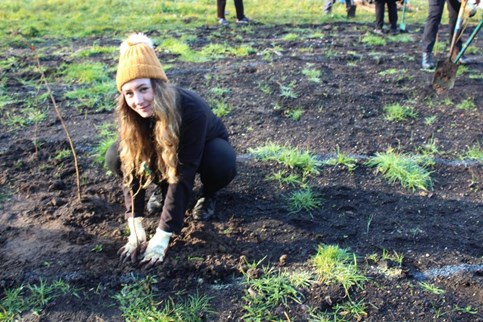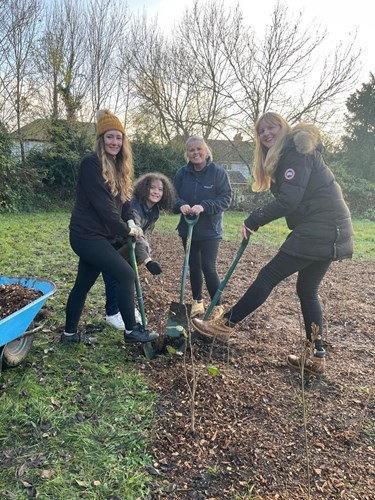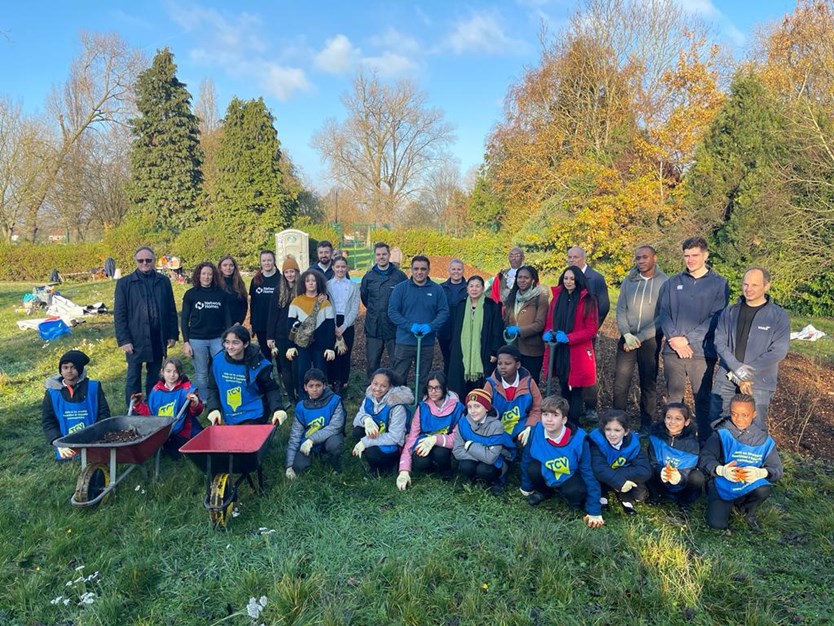INTERVIEW: Meet Nichola, the resident behind Wembley's new mini-forest
21 March 2023
Did you know that today is International Day of Forests? The United Nations General Assembly declared 21 March as International Day of Forests in 2013 to celebrate and raise awareness of the importance of all types of forests. There is no better person to speak on this topic than Nichola Rogers, a Brent based resident who is the brains behind the creation of the Queen Elizabeth Platinum Jubilee Forest in Wembley, so to celebrate International Day of Forests, we did just that!
Nichola has been living in a home managed by Network Homes for nearly 10 years where she has been a Community Ambassador and now a Sustainability Ambassador. In these roles, and combined with her passion for the environment, human and animal rights, she’s worked with us to improve services and the environment, creating better communities for residents to live in. She proposed the idea of a Miyawaki forest to us a few years ago and together we worked with Brent Council and Wates to bring her idea to life, with the forest being officially planted in December 2022. Read our interview with Nichola below, where she shares more on how and why she thought it was important to create this forest.
What was your idea for this project and how did it come about?
 I am a keen gardener and passionate about sustainability. I enjoy reading about different planting methods and new green innovations which is how I found out about this method of planting. Akira Miyawaki, a Japanese botanist and an expert in plant ecology, specialised in seeds and natural forests. He was active worldwide as a specialist in natural vegetation restoration of degraded land. He developed a technique of plantation in the 1980s in which a variety of plants are sowed within a small distance i.e., 3-4 plants/sq. Meter. This way of planting creates a denser forest with a mixed variety of plants in a small area and within a short period of time.
I am a keen gardener and passionate about sustainability. I enjoy reading about different planting methods and new green innovations which is how I found out about this method of planting. Akira Miyawaki, a Japanese botanist and an expert in plant ecology, specialised in seeds and natural forests. He was active worldwide as a specialist in natural vegetation restoration of degraded land. He developed a technique of plantation in the 1980s in which a variety of plants are sowed within a small distance i.e., 3-4 plants/sq. Meter. This way of planting creates a denser forest with a mixed variety of plants in a small area and within a short period of time.
When I was researching this planting method, I saw that it had been recreated in Europe and the first one had been successfully completed in the South West of England in 2020. Therefore, I knew it was possible and I wanted to apply this method to an urban forest in London.
How did Network Homes support you in getting this project off the ground?
I shared my idea with the Resident Engagement team at Network Homes and together we partnered with other companies including Wates Living Space who provided the funding, Brent Council who provided the land (a small section of King Edwards Park in Wembley) and The Conservation Volunteers who provided the agricultural expertise and plants/trees.
Why is increasing access to green spaces important to you?

People and plants are entwined by threads that reach back to our earliest experiences, as individuals and as a species. It is paramount we have access to green spaces for the many physical and mental benefits it provides us with.
The environment, sustainability and biodiversity are at the forefront of my values. As I believe nature reminds us how to be in harmony with life itself, we are all connected. As you develop your awareness in nature, you begin to see how we influence all life and how all life influences us. I feel as a civilisation, we are losing the connection with nature, due to the amount of land being destroyed for farming and building.
In turn we are eradicating species faster than any other time recorded in history. We are losing the ability to be self-sustaining because consumerism has taken over. We need to stop and think deeply about what type of world we wish to leave behind for future generations. I wish to try to make as many positive changes as possible in myself, my community and the world.
How will the forest benefit the environment and local community?
One of the benefits of the forest for the local community will be the improvement to air quality. Plants reduce air temperature, directly removing pollutants from the air through their leaves, offsetting carbon dioxide emissions. Oxygen is needed by all humans and wildlife and is one of the commonly cited benefits of urban trees. It’s also an opportunity for local biodiversity to flourish, a safe place for animals to live and thrive.
Urban forests are not only beautiful and functional, but they are also associated with a large number of health benefits, including lower premature mortality, longer life expectancy, fewer mental health problems, less cardiovascular disease, better cognitive functioning in children and the elderly, and healthier babies.
How does it feel to see this forest become a reality?
It feels amazing to see my idea become a reality, although it wasn't as easy of a task as what I had originally thought. The project has taken longer than expected due to setbacks such as excavation resources. Nevertheless, the long wait has been well worth it and I’m filled with an abundance of happiness to see how one small idea and taking action about it, can make a positive difference to our community and our environment. These little sticks of glory will grow into a new urban forest.
Why is it important to make more projects like this happen in local communities?
I believe it is our social responsibility to take action and start projects that benefit the community and the environment. It is important that the council, charities and companies in the community help create and facilitate opportunities for this to happen. People have amazing ideas but unfortunately there isn't always an avenue for it to become a reality, with constant cuts being made and struggles in the economy. Nevertheless, it is paramount that we support individuals that wish to make a positive change and give them a platform, funding and support to create a better world.
Projects like this create environmental awareness and bring attention to the many reasons why it's so important to have more green spaces. With the ever-changing climate, green spaces help save water and electricity consumption, filter general environmental pollution and capture heavy metals from the environment.
Do you hope to see the Miyawaki method adopted in other parts of Brent?
I think it's a great method to use in cities and built-up areas such as Brent. You can create a thriving forest in ten to twenty years, as opposed to eighty or hundred years using a more traditional method.
Brent declared a climate emergency in 2019 and set a goal to be the greenest borough in London by 2030. Creating urban forests using the Miyawaki method is a great way to achieve this goal. It is positively impacting the environment by helping to mitigate air pollution, heat and noise levels, as well as creating more green spaces.
In Brent’s Strategy and Action Plan for Mental Wellbeing 2018-2023, a studied showed that an estimated 16% of the adult population in Brent has a common mental health disorder which is slightly higher than the national comparison of 15.1%. These findings show that mental distress is highly prevalent in Brent, consequently indicating that a noticeable proportion of people living in Brent are at risk of moving further down the mental health spectrum towards poor mental wellbeing and mental illness.
Green spaces provide physical, mental, emotional, and psychological benefits to its residents. Studies show that looking at nature enhances humans in doing tasks that require long periods of direct attention. People are less frustrated, more patient, have greater enthusiasm for work, better health, and have an overall higher life satisfaction than those without contact with nature. As well as providing opportunities for physical exercise and social interaction, both of which led to a mental and physical wellbeing.
I would love to create more urban forests in Brent and around London. I am truly grateful to have manifested Brent’s first Miyawaki urban forest.
Anything else you would like to say about the project?
It has been an absolute pleasure working with everyone from the project team. I wish to give special thanks to Crystal and Shauna in the Resident Engagement team at Network Homes for their dedication to this project and for fully supporting me through this process. I hope to work with them again in the future. Another person who was at the heart of this project and a key part of bringing it to life was Christina from Wates Living Space. Thanks to Samantha from Brent Council too for finding the most perfect space for the forest to thrive and being devoted to the project from start to finish. Lastly thank you to The Conservations Volunteers (TCV) for being a great charity and supporting the green movement.

Find out more about the Queen Elizabeth Platinum Jubilee Forest here

